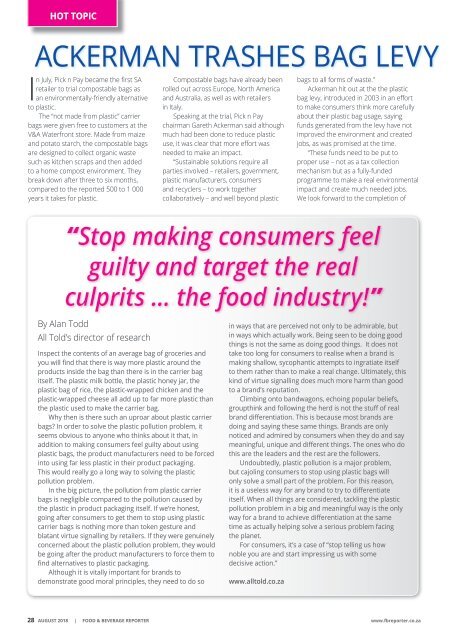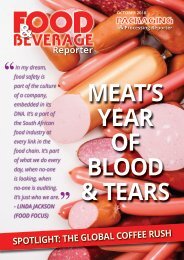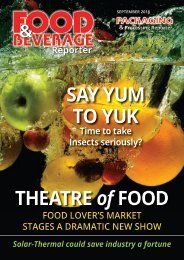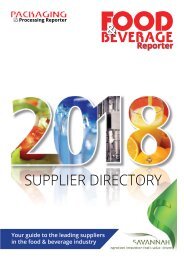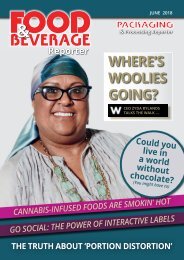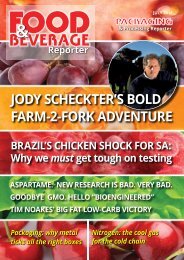Food & Beverage Reporter August 2018
South Africa's leading B2B magazine for the food & beverage sector and its allied industries in processing/packaging etc
South Africa's leading B2B magazine for the food & beverage sector and its allied industries in processing/packaging etc
Create successful ePaper yourself
Turn your PDF publications into a flip-book with our unique Google optimized e-Paper software.
HOT TOPIC<br />
ACKERMAN TRASHES BAG LEVY<br />
In July, Pick n Pay became the first SA<br />
retailer to trial compostable bags as<br />
an environmentally-friendly alternative<br />
to plastic.<br />
The “not made from plastic” carrier<br />
bags were given free to customers at the<br />
V&A Waterfront store. Made from maize<br />
and potato starch, the compostable bags<br />
are designed to collect organic waste<br />
such as kitchen scraps and then added<br />
to a home compost environment. They<br />
break down after three to six months,<br />
compared to the reported 500 to 1 000<br />
years it takes for plastic.<br />
Compostable bags have already been<br />
rolled out across Europe, North America<br />
and Australia, as well as with retailers<br />
in Italy.<br />
Speaking at the trial, Pick n Pay<br />
chairman Gareth Ackerman said although<br />
much had been done to reduce plastic<br />
use, it was clear that more effort was<br />
needed to make an impact.<br />
“Sustainable solutions require all<br />
parties involved – retailers, government,<br />
plastic manufacturers, consumers<br />
and recyclers – to work together<br />
collaboratively – and well beyond plastic<br />
bags to all forms of waste.”<br />
Ackerman hit out at the the plastic<br />
bag levy, introduced in 2003 in an effort<br />
to make consumers think more carefully<br />
about their plastic bag usage, saying<br />
funds generated from the levy have not<br />
improved the environment and created<br />
jobs, as was promised at the time.<br />
“These funds need to be put to<br />
proper use – not as a tax collection<br />
mechanism but as a fully-funded<br />
programme to make a real environmental<br />
impact and create much needed jobs.<br />
We look forward to the completion of<br />
“Stop making consumers feel<br />
guilty and target the real<br />
culprits ... the food industry!”<br />
By Alan Todd<br />
All Told’s director of research<br />
Inspect the contents of an average bag of groceries and<br />
you will find that there is way more plastic around the<br />
products inside the bag than there is in the carrier bag<br />
itself. The plastic milk bottle, the plastic honey jar, the<br />
plastic bag of rice, the plastic-wrapped chicken and the<br />
plastic-wrapped cheese all add up to far more plastic than<br />
the plastic used to make the carrier bag.<br />
Why then is there such an uproar about plastic carrier<br />
bags? In order to solve the plastic pollution problem, it<br />
seems obvious to anyone who thinks about it that, in<br />
addition to making consumers feel guilty about using<br />
plastic bags, the product manufacturers need to be forced<br />
into using far less plastic in their product packaging.<br />
This would really go a long way to solving the plastic<br />
pollution problem.<br />
In the big picture, the pollution from plastic carrier<br />
bags is negligible compared to the pollution caused by<br />
the plastic in product packaging itself. If we’re honest,<br />
going after consumers to get them to stop using plastic<br />
carrier bags is nothing more than token gesture and<br />
blatant virtue signalling by retailers. If they were genuinely<br />
concerned about the plastic pollution problem, they would<br />
be going after the product manufacturers to force them to<br />
find alternatives to plastic packaging.<br />
Although it is vitally important for brands to<br />
demonstrate good moral principles, they need to do so<br />
in ways that are perceived not only to be admirable, but<br />
in ways which actually work. Being seen to be doing good<br />
things is not the same as doing good things. It does not<br />
take too long for consumers to realise when a brand is<br />
making shallow, sycophantic attempts to ingratiate itself<br />
to them rather than to make a real change. Ultimately, this<br />
kind of virtue signalling does much more harm than good<br />
to a brand’s reputation.<br />
Climbing onto bandwagons, echoing popular beliefs,<br />
groupthink and following the herd is not the stuff of real<br />
brand differentiation. This is because most brands are<br />
doing and saying these same things. Brands are only<br />
noticed and admired by consumers when they do and say<br />
meaningful, unique and different things. The ones who do<br />
this are the leaders and the rest are the followers.<br />
Undoubtedly, plastic pollution is a major problem,<br />
but cajoling consumers to stop using plastic bags will<br />
only solve a small part of the problem. For this reason,<br />
it is a useless way for any brand to try to differentiate<br />
itself. When all things are considered, tackling the plastic<br />
pollution problem in a big and meaningful way is the only<br />
way for a brand to achieve differentiation at the same<br />
time as actually helping solve a serious problem facing<br />
the planet.<br />
For consumers, it’s a case of “stop telling us how<br />
noble you are and start impressing us with some<br />
decisive action.”<br />
www.alltold.co.za<br />
28 AUGUST <strong>2018</strong> | FOOD & BEVERAGE REPORTER www.fbreporter.co.za


